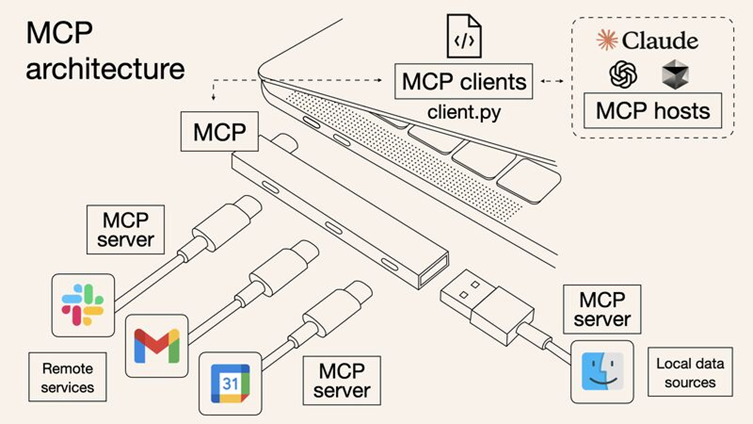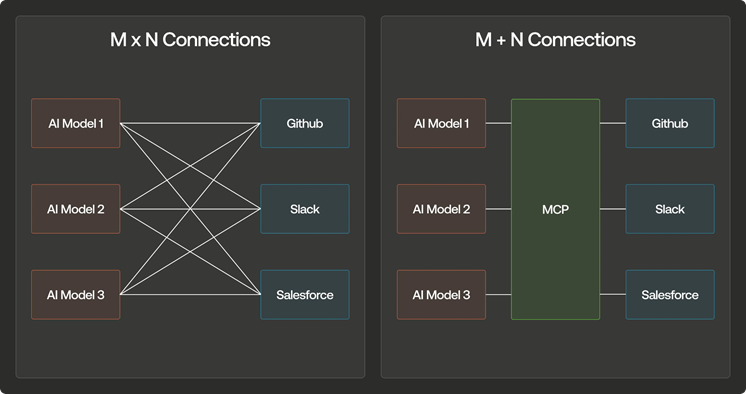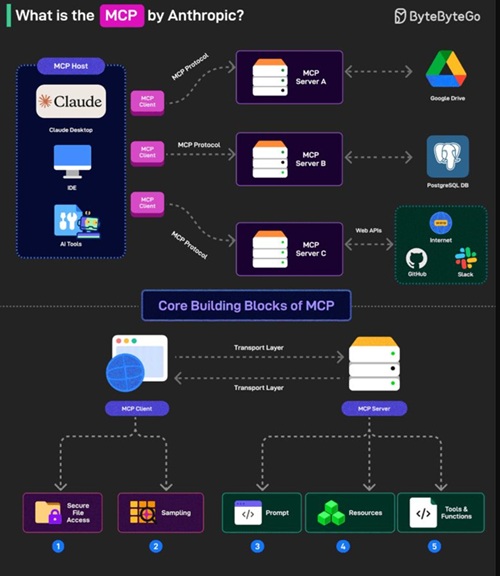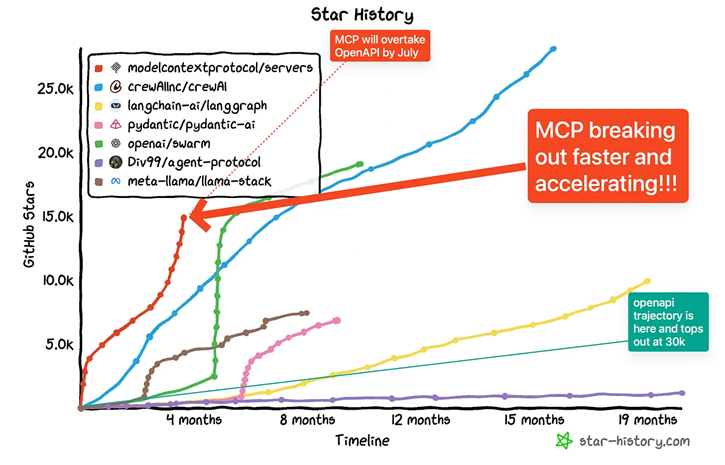The world of AI is evolving at high speed: on the one hand, language models (LLMs) are progressing and are able to generate increasingly relevant content; on the other, the needs of businesses require ever more fluid integration with their tools and data.
It's against this backdrop that MCP (Model Context Protocol) is emerging as an open standard for connecting AI assistants to real-world services and information sources. In this article, you'll discover why MCP is a game-changer, how it works in broad strokes, and what concrete uses it is already enabling.
What is Model Context Protocol (MCP)?
The Model Context Protocol, introduced by Anthropic at the end of 2024, defines a standard way for an AI assistant to connect to external resources (databases, business applications, messaging tools, etc.).
The goal:
- Avoid developing in-house connectors for each service.
- Enable AI to access up-to-date data or perform concrete actions (create a ticket, send a message...) via services exposed in a unified way. E
In short, MCP acts like a "USB port" for AI: you plug an "MCP server" into the assistant, and the latter immediately knows what types of actions or content it can exploit, without having to code a specific integration each time.

Why such a protocol?
1. Breaking down fragmentation
Historically, even an advanced LLM remained locked in his own bubble: he knew only his own training (often frozen) and couldn't interact directly with services or up-to-date data. For each source (CRM, calendar, knowledge base...), we had to develop an ad hoc connector, which was cumbersome and not very scalable.
With MCP, we unify this approach: the AI discovers an available MCP server and immediately knows what actions or data are proposed, via a common language.

2. Really useful, contextual AI
AIs become more powerful when they have access to something concrete:
- Corporate info (wiki, tickets, internal documents)
- Real-time data (prices, inventory, weather, error logs)
- Action systems (send a Slack message, schedule an appointment...)
MCP servers make it possible to "plug in" these flows of data and tools without recoding each integration. AI gains in relevance and capacity for action.
3. Standardizing safety and governance
In a professional context, you don't want to give AI carte blanche. MCP has been designed to separate AI logic (MCP host) from access logic (MCP server):
- API keys or sensitive access remain on the server side
- The user can approve or reject risky operations
- Activity logs track everything the AI does
ResultsThe result is centralized governance and less risk of data leakage, unlike in-house integrations where identifiers were sometimes exposed in a haphazard way.
Simplified architecture
Technically, MCP operates in client-server mode:
The MCP customer is integrated into the AI application (e.g. Claude Desktop, a VS Code or Cursor extension, etc.). It receives instructions from the user.
MCP servers are processes (local or remote) that expose :
- Resources (documents, data, history, etc.)
- Tools (functions for interacting with apps, browsing, posting messages).
- Prompts or "query templates" (to guide the AI in certain specialized tasks)
The protocol defines how client and server interact: requests (to read a document, call a function, etc.) and responses (raw data, API results, etc.) follow a single format, based on standards such as JSON-RPC.
For the end user, it's all behind the scenes. He simply sees that his AI assistant can "fetch" information or trigger actions seamlessly, without multiple manual configurations.
When several MCP servers are connected to a single IA host, the result is an integration hub:
Example: an AI assistant in a company can call :
- A "Google Drive" MCP server (to retrieve a file)
- A Git MCP server (to read code or create a branch)
- A "Slack" MCP server (to send an alert message)
- And so on...

Case studies
1. Collaboration and enterprise data
- Slack + Google Drive + Atlassian: AI finds a document in Drive, checks Jira tickets, and summarizes a Slack conversation for the team. Everything goes through MCP servers already available (often open source) or officially proposed (e.g. Atlassian MCP server for Jira/Confluence).
- Internal confluence + SQL databases: The assistant draws on the company's documentation and performs queries on a database in real time to provide relevant answers.
2. Development and DevOps
- GitHub MCP: AI can search for a specific file, propose a commit message, or create a Pull Request.
- Puppeteer MCP: AI controls a headless browser, executes end-to-end tests and reports error logs.
3. Research and monitoring
- ArXiv MCP: AI queries the platform to find the latest articles on a research topic.
- Brave Search or Google News MCP: the agent can perform up-to-date web searches to fill in the gaps in time.
4. Personal assistant or consumer automation
- Calendar: propose a time slot for an appointment, then send the e-mail invitation.
- Local applications: an MCP "File system" server can list or open certain documents, as long as the user authorizes it.
MCP vs. traditional AI integrations
Single standard vs. customized integrations In the past, every time you wanted AI to access a new service, you had to recreate a connector with specific APIs. MCP sweeps away this problem by offering a universal framework. Once an AI host supports MCP, it can connect to any MCP server.
Fresh data and two-way interaction In a conventional AI system, the model remains passive: it can only receive prompts and respond to them. Here, the AI acts: it can make requests, trigger tasks... and receive live feedback (with the user's agreement).
Enhanced safety With MCP, credentials remain server-side; the AI never sees API keys or passwords. Actions are validated, and a "local-first" mode limits risks.
Easier development For the developer, it saves time: no need to manage N separate connectors. Simply build an MCP server (often with a few lines of Python, JavaScript or similar) that follows the specification, or reuse the many open source servers already available.
Benefits for companies and developers
- Interoperability : the same protocol serves multiple services. This reduces complexity and speeds up integration.
- Maintenance savings instead of having M × N connections to maintain (M tools × N AI agents), we end up with a centralized scheme: we implement MCP once, and any evolution benefits the whole.
- Clear governance access filtering, action tracing, domain-based permission restrictions (e.g. read-only access to a folder).
- An expanding ecosystem Each new "block" (MCP server) is immediately available to all MCP hosts. This network effect stimulates innovation.
Outlook
- More agentic AI agents With MCP, AI can already link together complex actions: consulting logs, launching a test, posting a Slack message, editing a document... We're getting closer to the dream of a "Jarvis" assistant who orchestrates several tools in a fluid, coherent way.
- Towards an industry standard Many companies have already announced their support for MCP. There's every indication that this protocol could become the benchmark for linking AI and business services, much like REST or GraphQL for web APIs.
- Advanced governance and security As experience is gained, access control, approval and unified logging mechanisms will be perfected. The growing power of AI calls for finer-grained supervision, and MCP offers a solid foundation for reconciling efficiency and compliance.
- Expanding the ecosystem As the community develops new MCP servers for all kinds of services (ERP, marketing automation, 3D, etc.), integrating AI into our daily lives will become easier and easier.

Conclusion
Initiatives like MCP demonstrate a fundamental trend: to make AI agents truly versatile, connected and capable of integrating into different environments. We're no longer at the stage of "just" asking questions of an LLM: AI can now act, interact and orchestrate multiple systems.
Google has also entered the fray with Agent2Agent (A2A), a new open protocol designed to facilitate communication between agents from different frameworks. A2A focuses on the discovery of each agent's capabilities (via "Agent Cards"), task management and secure interoperability: we find the same desire to standardize, this time for exchanges between agents. Whether it's MCP for connection to external tools or A2A for inter-agent dialogue, open protocols are multiplying and foreshadowing an ever more "connected" AI.
Coming soon: how to get started with MCP!
Discover our AI expertise and contact our experts to discuss your projects and specific needs.
By Jérémy BRON, AI Director, Silamir Group



